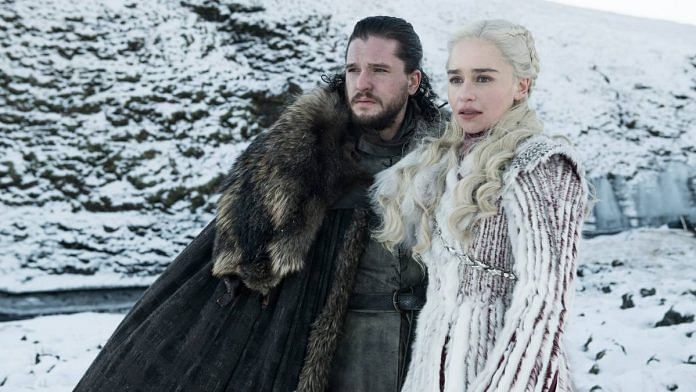Watching Sunday night’s premiere of the final season of “Game of Thrones,” wondering what will happen next, I had a thought: Why don’t we already know what’s going to happen next? I’ve asked myself that question before, and I still don’t think I have a good answer.
We live in a world where investigative reporters can winkle out secrets from the Central Intelligence Agency and the special counsel’s investigation of Donald Trump’s presidential campaign — places, that is, where leakers can be prosecuted. I understand that the vengeance of Hollywood can be awful, but surely a few noncompete agreements wouldn’t be able to keep the secrets if the journalists really wanted to try. Given the worldwide excitement over this last piece of television monoculture, it’s hard to believe that a New York Times article based on interviews with unnamed sources in a position to know all this season’s plot twists in advance wouldn’t have a few zillion clicks.
I’ve long thought this evident failure of journalistic enterprise was the result of an implicit bargain: The audience doesn’t want to be told the answers in advance, so to speak, and we would be furious at anyone who disclosed them. On reflection, however, I am no longer so sure this is true.
Sure, we’ve all known fans so zealous that if they’re unable to watch a new episode of “Game of Thrones” on a Sunday will studiously avoid social media until they’ve caught up, lest the event be spoiled for them. But many of the same fans flock to the websites that try to predict who’s going to die next. And, during the off-season, many others gravitate to websites promising inside information.
The claims of inside information are everywhere. If a few photographs have been spirited from the set, you can be sure they will be studied as if holding the key to life eternal. A casting call for a couple of children causes waves of speculation. An actor spotted in public risks having his hairstyle dissected for clues to what’s about to happen. For the uber-fan, even which hotel an actor has been spotted at turns out to be a thing.
Is it really plausible, then, that if a major news outlet were to print excerpts from the scripts for the rest of season eight, the fan base would turn upon the editors in righteous fury? I think not. I think the fan base would gobble up every scrumptious morsel. Because they already do.
To be sure, there’s no particular reason to think that widely circulated “Thrones” rumors will turn out to be true. After Sunday night, a popular Reddit post (alleged spoilers at link) purporting to set out the details of every episode of season eight is already rife with errors.
But this is my point. Of course the rumor mill is rife with errors. What else could we expect? The people who traffic in “Game of Thrones” leaks (intentional leaks, some say, intended to mislead) aren’t professional journalists. They have no experience in gaining the trust of sources, or in working out what parts of the sources’ stories are reliable.
And so we return to the original question: Given the enormous fan interest in what’s going to happen next, why don’t editors assign a few of their people to try to find out? I’ve come up with three new theories.
First (harder) theory: The way valuable media properties interlock, it’s a rare company that doesn’t have its fingers in both content production as well as news. Should the companies start reporting what secret plots the others intend for their most popular shows, they put themselves on the path to mutually assured destruction. (That is, lower ratings.) The trouble with this theory is that media companies constantly report bad news about each other — and even, at times, about themselves.
Second (simpler) theory: The idea has never occurred to them. No self-respecting editor would assign an investigative team to find out what happens next on a television show because the world of entertainment doesn’t count as “real” news. But it’s not like Walter Cronkite still rules. Lots of people watch the news precisely in order to be entertained. (Okay, ancient observation.) Besides, as I’ve suggested, serious, well-sourced spoiler stories would have a huge readership.
Also read: Want to watch Game of Thrones live? Just tune into the Indian election
Third (simplest) theory: The reporters and editors are all “Game of Thrones” fans. They’ll never peek behind the curtain because they don’t want the surprises ruined for themselves and their friends.
I find the third theory attractive, perhaps for selfish reasons: It casts those who write for a living in a positive light. Writers in general, and working journalists in particular, come in for a lot of flak, some of it justified. So muzzy a concept as freedom of the press is far easier to defend if reporters and editors turn out to be a lot like everybody else.
- Okay, maybe it won’t be the last television program we all watch together. On the other hand, maybe it will.
- Yes, professional journalists are highly imperfect at this art, but on the whole they do it better than the amateurs. (Which is not to say I object to the amateurs, a group in which I number myself.)



